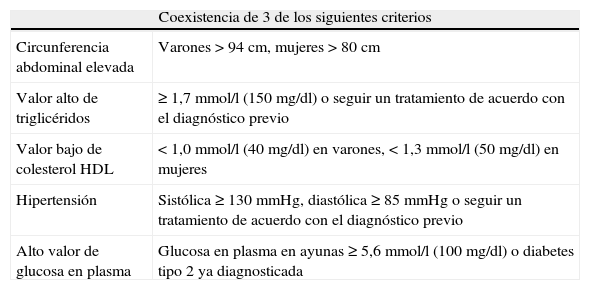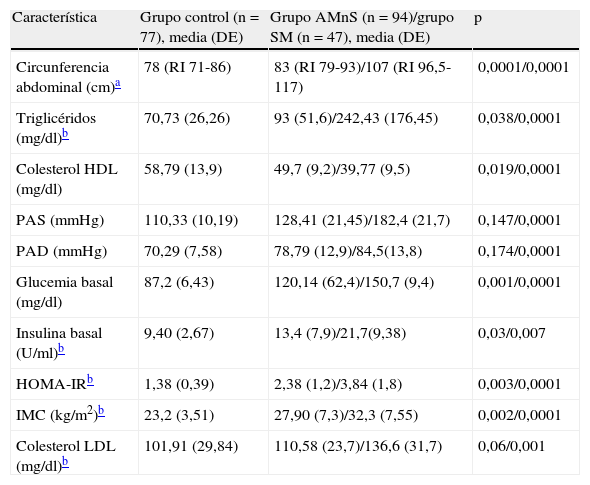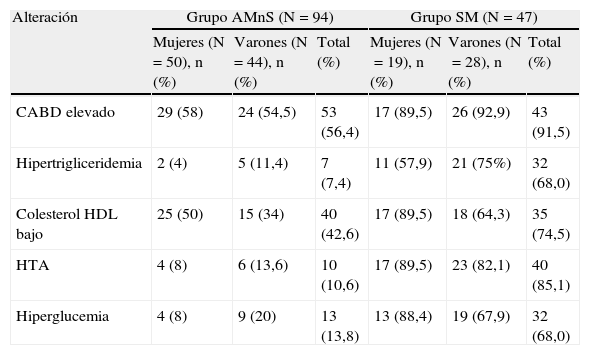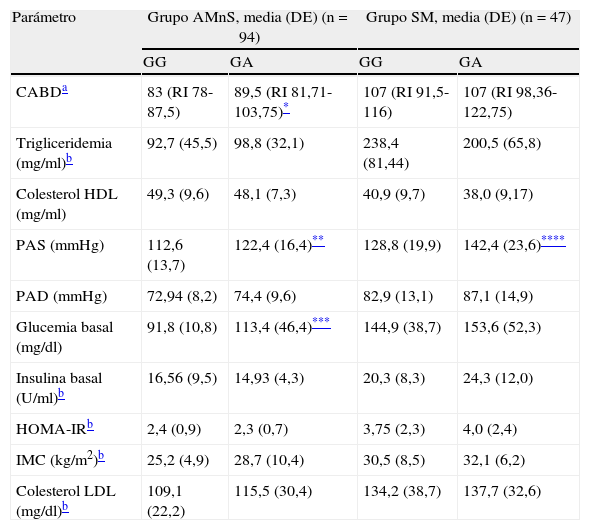Diversos polimorfismos del gen de la resistina (RETN) se han asociado con alteraciones metabólicas. En este estudio se evaluó la asociación entre el polimorfismo 3’UTR +62G>A del gen RETN y elementos del síndrome metabólico.
Sujetos y métodoLa población de estudio (n=218) fue distribuida en 3 grupos: control, sin alteraciones metabólicas (n=77); AMnS, con alteraciones metabólicas aisladas (n=94); y SM, con síndrome metabólico (n=47). El polimorfismo 3’UTR +62G>A se analizó por PCR-RFLP.
ResultadosLa obesidad central fue la alteración más frecuentemente descrita tanto en el grupo AMnS (56,4%) como en el SM (91,5%), seguida de bajos niveles de colesterol unido a lipoproteínas de alta densidad (colesterol HDL) (42,6%) en el grupo AMnS e hipertensión arterial (85%) en el grupo SM. La frecuencia del genotipo +62G/A para la población fue del 20,2%. El genotipo G/A fue más frecuente en los grupos SM (38,3%) y AMnS (17%) que en el grupo control (13%). La distribución alélica fue significativamente diferente entre grupos control (+62G=0,94, +62A=0,06) y SM (+62G=0,81, +62A=0,19) (p=0,0001). Se encontró asociación significativa entre el genotipo G/A y valores elevados de circunferencia abdominal (p=0,047), glucemia basal (p=0,02) y presión arterial sistólica (p=0,003).
ConclusiónLos resultados sugieren una asociación del genotipo RETN +62G/A con valores elevados de presión arterial sistólica, hiperglucemia y obesidad central. La asociación con estas alteraciones parece ser independiente de posibles efectos de agrupación en el contexto de síndrome metabólico.
The polymorphism of the resistin gene (RETN/RSTN) has been associated with metabolic alterations. In this study the association between the 3’UTR +62G>A polymorphism and metabolic syndrome components was evaluated.
Subjects and methodsThe population (n=218) was distributed in 3 groups: the control group with no metabolic alterations (n=77), nSMA group with isolated metabolic alterations (n=94) and MS group with metabolic syndrome (n=47). The 3’UTR +62G>A polymorphism was analyzed by PCR-RFLP.
ResultsCentral obesity was the most frequent alteration in both nSMA (56.4%) and MS (91.5%) groups followed by low c-HDL levels in the nSMA group (42.6%) and arterial hypertension in the MS group (85%). The frequency of the +62G/A genotype was 20.2% in the population. The G/A genotype was more frequently found in the MS (38.3%) and nSMA (17%) groups than in the control group (13%). The allelic distribution between the control group (+62G=0.94, +62A=0.06) and MS group (+62G=0.81, +62A=0.19) was significantly different (P=.0001). Significant associations between the G/A genotype and high values of abdominal circumference (P=.047), basal glycemia (P=.02) and systolic arterial pressure (P=.003) were found.
ConclusionThe findings suggest the association between the G/A genotype and high values of systolic arterial pressure, basal glycemia and abdominal circumference. This association was independent of the metabolic syndrome context.
Artículo
Comprando el artículo el PDF del mismo podrá ser descargado
Precio 19,34 €
Comprar ahora












